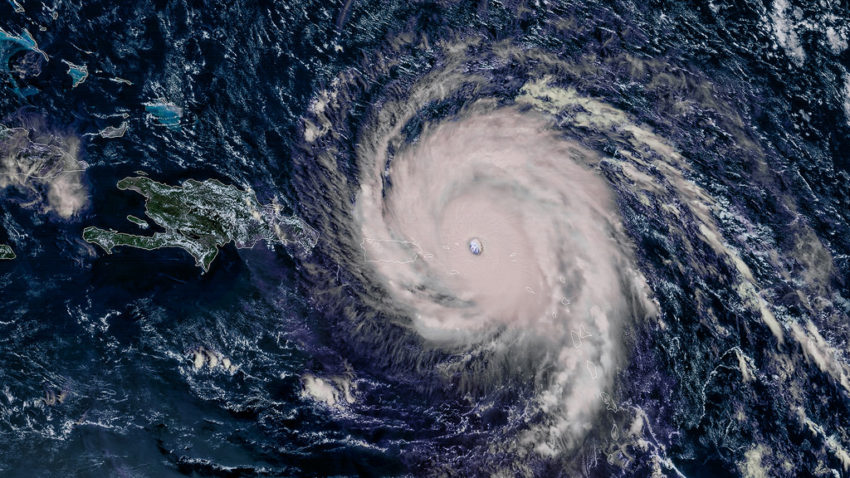Hurricanes Irma and Harvey and the Conversation About Climate Change
Experts agree that while it’s not possible to pinpoint climate change as the cause of the recent storms sweeping through the U.S. and the Caribbean, it’s certain that global warming has had its hand in intensifying both Hurricane Harvey and Hurricane Irma.
Harvey, which devastated Houston recently and left at least 70 dead, has also had a series of environmental impacts aside from massive flooding, including increased air pollution and a toxic waste spill at a Texas chemical plant. Just days after the hurricane hit the United States, and as politicians scramble to figure out what to do in its aftermath, Category 5 storm Irma has begun to sweep through the Caribbean and is on its way to Florida.
After Irma made landfall on the islands of Antigua and Barbuda on Wednesday, residents were left reeling from the destruction, with more than half of Barbuda’s inhabitants left homeless. Antigua and Barbuda Prime Minister Gaston Browne said Thursday:
It was heart-wrenching, absolutely devastating. I have never seen any such destruction on a per capita basis compared to what I saw in Barbuda this afternoon … Ninety-five percent of the properties in Barbuda were damaged. The infrastructure was damaged, all of the institutions, the lone hospital, the schools, it is absolutely heart-wrenching.
Irma’s death toll has already reached at least 10 as of Thursday morning.
Both storms have heightened tensions surrounding the conversation on climate change. While some were quick to claim that it was insensitive to be discussing environmental policy at a time of devastation, and even the Environmental Protection Agency, led by known climate-change skeptic Scott Pruitt, says scientists are “trying to politicize an ongoing tragedy,” author Naomi Klein argues there is actually no better time than now to talk about the issue. In a piece for The Intercept in late August, Klein criticized media coverage of storm Harvey with logic that applies to Irma, as well:
Now is exactly the time to talk about climate change, and all the other systemic injustices — from racial profiling to economic austerity — that turn disasters like Harvey into human catastrophes.Turn on the coverage of the Hurricane Harvey and the Houston flooding and you’ll hear lots of talk about how unprecedented this kind of rainfall is. How no one saw it coming, so no one could adequately prepare.What you will hear very little about is why these kinds of unprecedented, record-breaking weather events are happening with such regularity that “record-breaking” has become a meteorological cliche. In other words, you won’t hear much, if any, talk about climate change.This, we are told, is out of a desire not to “politicize” a still unfolding human tragedy, which is an understandable impulse. But here’s the thing: every time we act as if an unprecedented weather event is hitting us out of the blue, as some sort of Act of God that no one foresaw, reporters are making a highly political decision. It’s a decision to spare feelings and avoid controversy at the expense of telling the truth, however difficult. Because the truth is that these events have long been predicted by climate scientists. Warmer oceans throw up more powerful storms. Higher sea levels mean those storms surge into places they never reached before. Hotter weather leads to extremes of precipitation: long dry periods interrupted by massive snow or rain dumps, rather than the steadier predictable patterns most of us grew up with. … Talking honestly about what is fueling this era of serial disasters — even while they’re playing out in real time — isn’t disrespectful to the people on the front lines. In fact, it is the only way to truly honor their losses, and our last hope for preventing a future littered with countless more victims.
And though, as Klein argues, it’s imperative to acknowledge the effects of climate change at this crucial time, it’s not going to be easy to have this conversation while the country is so divided.






1 opmerking:
Ta!
Breaking 'Looting is a "serious" problem on Dutch part of the hurricane-hit island St Martin: Dutch PM Mark Rutte'
'Not all taxhavens are created equal'
Sint Maarten is different. It's always raining money somewhere as hotshots sail in it's trail.
Oxfam: Netherlands is EU top taxhaven
All 'n all results of not paying attention to trends: Fukushima 2011, Heiyan 2013, etc. mirroring the drought in Ethiopia last year & the year before, in Jemen, Sudan and Kenia 2017. Desert-ification of the African continent as a whole and super typhoons coupled to earthquakes disasters becoming more common in Asia.
Throwing money, money of whom to what in a bloody bottomless pit again and again. And airbenders distracting, benefitting endlessly...
[Nanobots securing new elites]
Een reactie posten